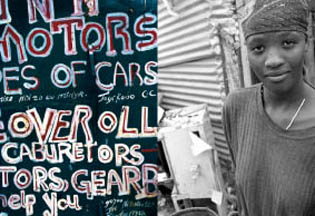Photographs of SOWETO
This post is also available in:
 French
French
Enclosed in the center of the townships, the camps of squatters in SOWETO sprawl toward outlying areas called Mandela camp, Freedom camp, Angola camp, Winnie camp, Kliptown… marginal to Johannesburg, 15 kilometers (24 miles) away. We enter this maze of narrow streets, where a large number of shacks crowd in, like in a banned world in which the benchmarks slowly drift and the signs are mixed up.
Location of all types of violence, women experience precariousness ; unemployment and neglect, rapes and AIDS, thefts, domestic violence and murder are very common. Trapped in hostile surroundings, these women show determination, and, from their destitution, dignity, and even a kind of sensuality, emerges.
By taking these unnamed portraits, I wanted to show a collective “biography” connecting history to geography, and bring these women back into focus and seize with a camera the wordless energy of their struggle. When I met them and while setting the camera angle, a mutuality settled quasi-instantaneously which has sometime in its briefness the power to bring to light a certain truth.
Thus, these women challenge us and win our heart by their generosity and their humanity.
Their housing structures are shacks made of a mixing of different materials and of recycled items such as wood, corrugated steel, advertising billboard, tarpaulin, cardboard, cloth and all kinds of plastic. The assembling is both functional and accidental. The walls are patchworks of forms, colors and typographical elements. An unpredictable graphical layout is created by the broken lines, the patterns and the signs. The wear out of the elements sketches forms that links up with the signs calligraphed by the inhabitants.
Away from dissipating the attention, the graphic structure side by side with the figurative element, the color with the black & white, the abstract composing with the portraits are meant to strengthen the emotion of these people. The social issues slide to a graphical aesthetic quality and vice versa. This play on the junctions combines at the same time the unpredictable nature of the color compositions, the marginality of the location and the anonymity of the portrayed women. Between chance and mutuality, the diptyches suggest in their difference a personal “cartography” of these camps.
Alexei Riboud
From 01/03/2007 to 28/04/2007
Galerie FAIT & CAUSE
58 rue Quincampoix
75004 Paris
France
Opening hours : du mardi au samedi, de 13h30 à 18h30
Phone : 01 42 74 26 36
contact@sophot.com
www.SoPhot.com



